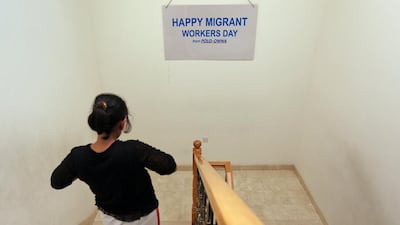When I was growing up in the US, most of my friends would get babysitters while their parents were away. I always had two live-in nannies who helped my parents with the housework and watched over the children. I remember these women fondly, as they became part of the family.
I dealt with a variety of domestic workers over the years and even if the relationship wasn’t as close as the one I had with my nannies, I was made to understand at a young age that each person was doing a job and had to be treated with respect.
Unfortunately, since I moved back to the UAE, it has not been uncommon for me to read stories about domestic workers being assaulted by their employers or about domestic workers committing crimes. While there is little data, Ministry of Interior figures suggest that there were about 750,000 domestic workers in the UAE in 2007. There are probably more now. Considering that this accounts for about 20 per cent of the foreign workforce, and domestic workers are a staple in many homes, we need to continue to address the issue not just legally but also socially.
In June last year, the ministry introduced a standard work contract for domestic workers to regulate the relationship between them and their employers.
The contract specifies the rights and obligations of each party, including hours of work and days off, with the employer generally bearing all expenses related to sourcing domestic workers, travel costs, accommodation and meals. Even the provision of health insurance for domestic workers is mandatory.
The rules give domestic workers protections under the civil transaction law, federal criminal law and the law on countering human trafficking. Yet the persistence of crimes involving domestic workers underlines the need for specific laws to address these issues, too.
It needs to be stressed that the UAE has made significant efforts against human trafficking and has implemented measures to protect and assist domestic workers, including providing shelters and rehabilitation services such as the Dubai Foundation for Women and Children. Abu Dhabi Police have run workshops in multiple languages for domestic workers, explaining their rights.
We need to continue to encourage these initiatives, and we should think of ways to prevent these problems from arising in the first place.
When I joined a friend in a very thorough apartment hunt in Abu Dhabi, I was appalled to see the size of many maids’ rooms in some of the newer buildings. These glorified closets would not fit a standard bed, let alone provide adequate living conditions for anyone. There should be a minimum size for any room that gets marketed as a living space.
Would-be domestic helpers should also undergo psychological screenings in addition to the usual medical tests, to make sure they can cope with the job. Furthermore, the agencies that source domestic workers need to be scrupulously monitored to ensure they aren’t bringing in underage people or lying to the workers about the nature of the job, they will be required to do.
More importantly, we need to reinforce the social norm that there be no kind of mistreatment, be it physical or verbal abuse, and that employers should never take advantage of their staff. We also need to make sure that nannies and maids get adequate time off.
Perhaps it is the physical work environment – working in a home rather than an office – that lends itself to some of the bad behaviour, but we as a society cannot and should not tolerate it.
Domestic staff do important work and those who employ them must ensure that they lead dignified lives.
Domestic workers have traditionally been seen as an extension of the family and their influence in our lives is immeasurable. But we sometimes need to be reminded that those people who care for our children, and us, should also be cared for.
Fatima Al Shamsi is a globetrotting Emirati foodie, film buff and football fanatic

